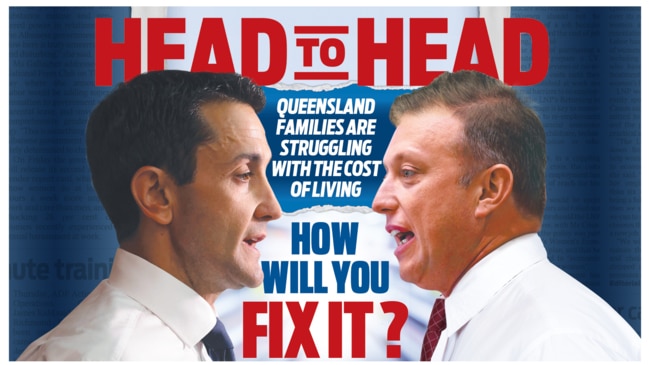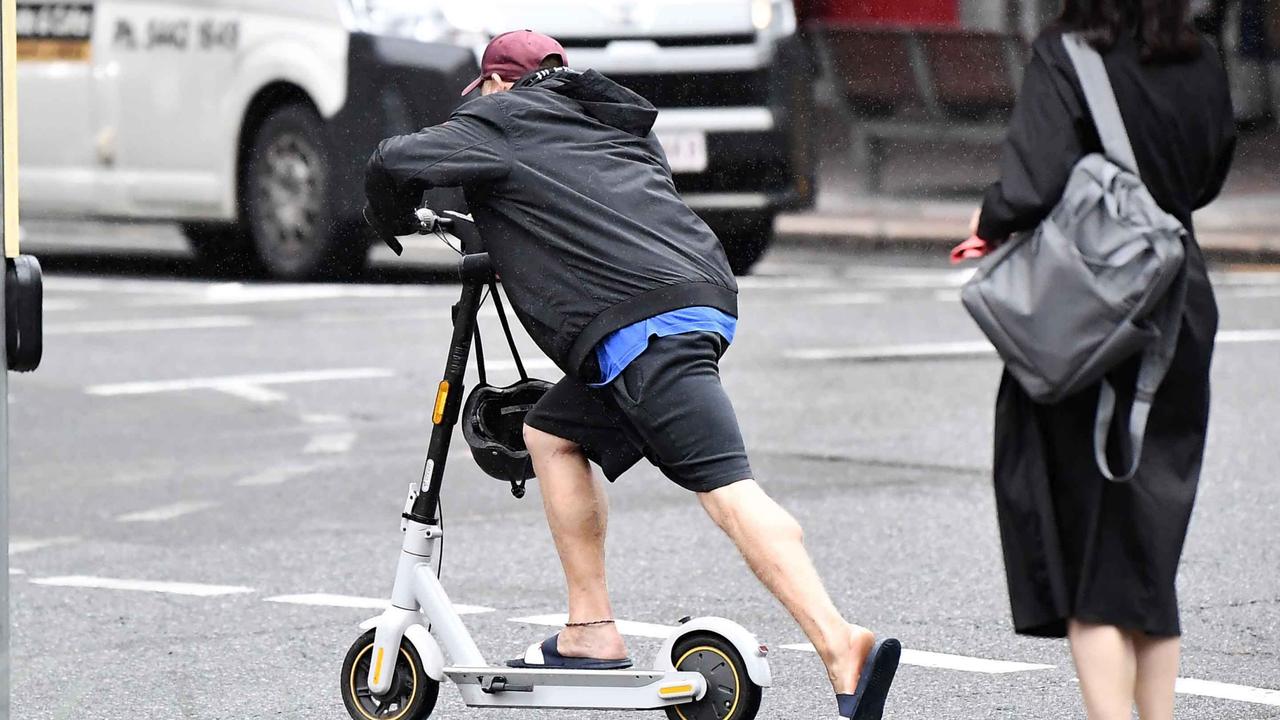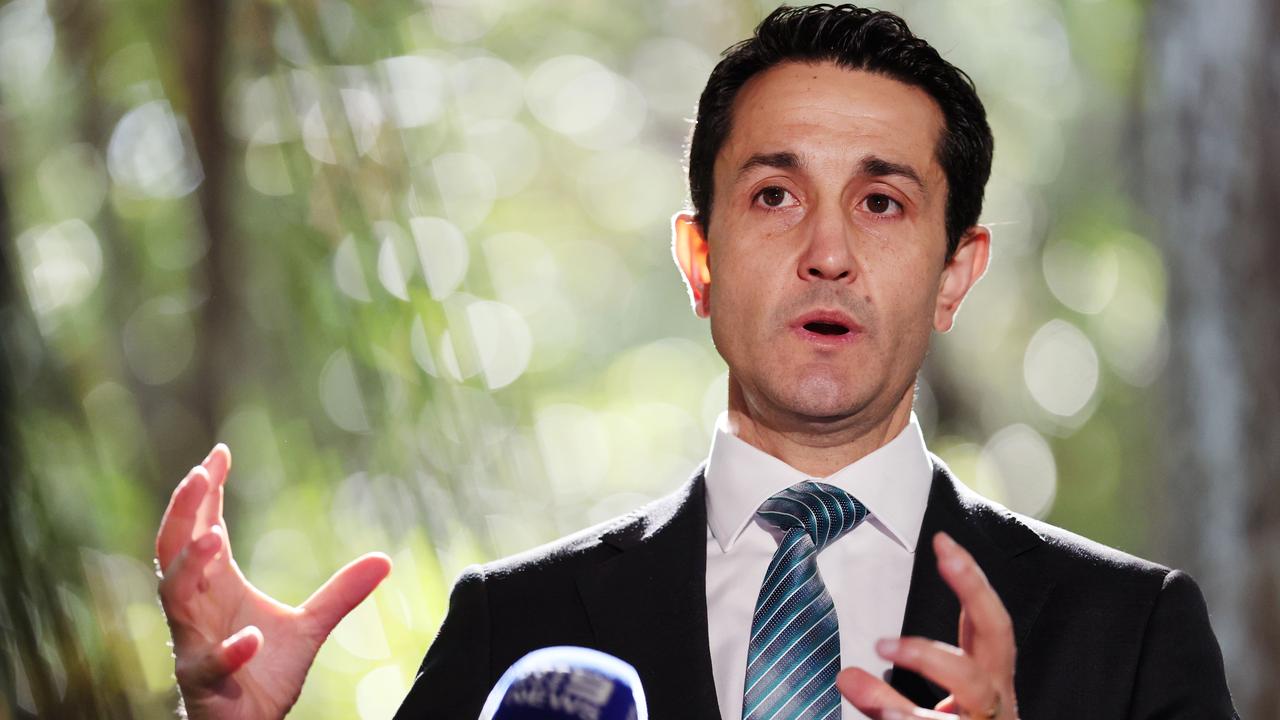Editorial: Cost pain requires longer-term fixes
Whichever party ends up in office, direct subsidies are an ultimately unstainable strategy for any government to assist with the cost of living, writes the editor.

Opinion
Don't miss out on the headlines from Opinion. Followed categories will be added to My News.
Premier Steven Miles and his LNP alternative David Crisafulli deserve full marks for how they approached yesterday’s head-to-head discussion about the cost-of-living pressures that so many Queenslanders face.
The pair kept their political pointscoring to a minimum, were civil to each other, and did their best to provide honest answers to questions from audience members selected by the Queensland Council of Social Service, readers of The Courier-Mail, and our state political editor Hayden Johnson – who moderated the hour-long live-streamed conversation that you can watch a replay of above.
The leaders even found some common ground – both agreeing that addressing soaring
cost-of-living pressures was the No.1 priority for whoever wins the next state election in October.
Mr Miles came with no new promises, instead armed with a pledge that this June’s state budget would be “the biggest cost-of-living budget ever”. The details were still being worked out, he said, but the result would presumably be another big jump in the government’s already large package of cost-of-living-focused subsidies, discounts, concessions and business-support programs, which last year topped $8bn – a 21 per cent increase on the previous year alone.
That is, of course, all good news for Queenslanders doing it tough. And it is politically attractive – a point not lost on Mr Crisafulli, who took the pragmatic approach of promising that an LNP government would not be removing the Labor government’s existing cost-of-living support schemes.
But whichever party ends up in office, this is an ultimately unstainable strategy for any government – using profits from its energy companies and its rivers of mining royalties gold to directly subsidise taxpayers through power-bill rebates and the like.
Sooner or later, the money either runs out – coal royalties have been at record highs, but can’t stay there forever – or has to be directed elsewhere to more urgent needs, such as shoring up an
under-pressure hospital system.
But also, although handing out subsidies might ease the pain of rising prices – and perhaps win a few votes – it does nothing to address any of the root causes of why these prices are rising in the first place, from soaring rents and construction costs to higher insurance and power bills.
It was on this point that Mr Crisafulli yesterday created a sharp division between the LNP’s and Labor’s approach to addressing cost-of-living pressures. He said that in addition to providing short-term relief, an LNP government would also focus on “structural reforms” to address some of those “big-ticket items” fuelling higher prices – from housing supply blockages to the impact on home insurance prices from youth crime, and government project cost overruns.
Mr Miles, by contrast, remained very much focused on the here and now – promising more handouts without offering much at all by way of big plans for the future.
Of course, at the moment, all we have from Mr Crisafulli is words and promises. He provided little detail on how the LNP might actually resolve these inflation-fuelling issues. But he at least recognised the need for thinking about how the government of the day goes about its core business.
Mr Crisafulli will have to spell out just how the LNP plans to deliver on his high-minded commitments before the election.
For Mr Miles, it is important that he and his ministers think beyond the handout as government policy and as the only solution to
cost-of-living pressures.
It might be hard for a now-nine-year-old government, but it also needs to be thinking of how to do things differently, more efficiently and more cost-effectively.
It needs to be looking closely at its own practices that are clearly fuelling inflation – from an apparent total indifference to big project cost overruns to letting unions call the shots on wages and working conditions.
DRIVE OUR DOLLAR FURTHER
The ongoing public anger about federal political expenses – sparked by revelations of Industrial Relations Minister Tony Burke spending $57,000 on a four-day trip to the US – is more than justified.
Today we report that thousands of dollars is being wasted by federal MPs who book the white Comcars for official business, then fail to turn up for their trip.
Nationals leader David Littleproud cancelled Comcar bookings 14 times in 2022 alone, incurring a $60 fee each time.
Indigenous Australians Minister Linda Burney cancelled or failed to show at 10 COMCAR bookings in the same year.
It might seem like a small amount in the grand scheme of things. But remember, all of this is your money – and it should be one of the primary responsibilities of every elected politician to ensure that they make every taxpayer dollar stretch as far as it can.
They should always be looking for ways to save money. Reporting in The Courier-Mail over the past week shows this isn’t the case.
Responsibility for election comment is taken by Chris Jones, corner of Mayne Rd & Campbell St, Bowen Hills, Qld 4006. Printed and published by NEWSQUEENSLAND (ACN 009 661 778). Contact details here


